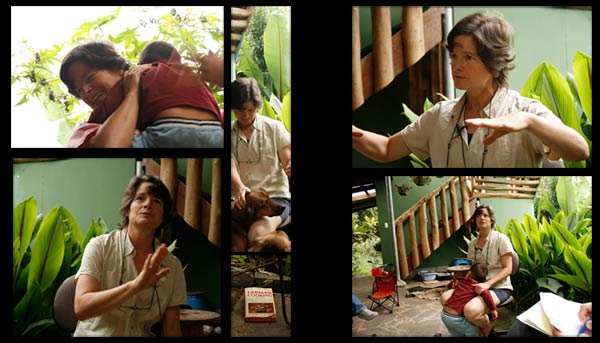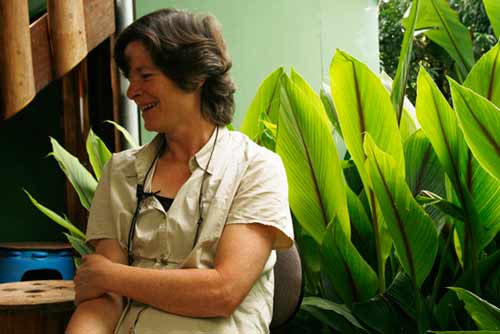Wendy Rockwell

Written by Lindsy R. Glick
A Passion for the Environment
Wendy Rockwell sits on a hand-made wooden chair, its feet—and hers—resting on a red, ceramic tile floor on the veranda of her carefully crafted home. She is facing the house, and the view behind her is a quasi-tropical paradise: banana and mango trees, green grass, mountains, blue sky and sunshine.
At her immediate surroundings are a wooden staircase leading to a small room with large windows, and tucked behind the stairs, an organic, self-composting toilet with a small bucket of leaves and ash sitting at its side. A small child, her grandson, crawls around on the floor at her feet, sometimes grinning up at her, and once, tottering to the edge of the patio and dropping his pants to pee.
 Wendy is a passionate woman. This can be seen in her surroundings, her intentional lifestyle and her political pursuits. Wendy is a Quaker woman, raised in Monteverde in a strange mix of Tica and Quaker cultures.
Her parents are both Quaker, but after their divorce, her father remarried a Costa Rican woman. Wendy spent twenty years in the United States, but returned to Costa Rica and the small, beautiful, complex community where she was born.
Wendy is a passionate woman. This can be seen in her surroundings, her intentional lifestyle and her political pursuits. Wendy is a Quaker woman, raised in Monteverde in a strange mix of Tica and Quaker cultures.
Her parents are both Quaker, but after their divorce, her father remarried a Costa Rican woman. Wendy spent twenty years in the United States, but returned to Costa Rica and the small, beautiful, complex community where she was born.
Her passions run strong on the political front, and one of her major beliefs is in the fuerza femenina, or feminine force. She knows that women have the power and the ambition to make changes, and in her political party, women are well represented: an entire fifty percent of the candidates on the last ballot were female. Wendy wants to promote women’s participation in politics, and for a few years created an organization to this end with the help of certain feminist activists in the area, such as Patricia Jiménez and Ilse Leitinger (EXPLAIN?). Having an association, though, became extremely complicated and required a lawyer and more work than the women were able to invest in the project.
Wendy’s forces have now turned to the important issues of land taxes and DR-CAFTA opposition. She sees land taxes as a viable solution for landowners to economically compensate for the rest of humanity and for damages done to the environment. Her philosophy is that the planet earth is common for all, that we all need access to land in order to live. No one has a deed from its maker for owning or exploiting it, and if landowners could thus make compensation to those who do not own land, a certain step will be made toward equality. Many social problems could be fixed by the redistribution of land taxes and the use of such funds toward community projects.
 Wendy's other focus is the DR-CAFTA, the Central American Free Trade Agreement with the United States and the Dominican Republic.
Opposition has since become obsolete, as it has been put to a referendum
and approved. It is unlikely, though, that she will have surrendered this front as lost.
Wendy's other focus is the DR-CAFTA, the Central American Free Trade Agreement with the United States and the Dominican Republic.
Opposition has since become obsolete, as it has been put to a referendum
and approved. It is unlikely, though, that she will have surrendered this front as lost.
Wendy no doubt speaks frequently with representatives and brings voice to the poor and underprivileged who have a tendency to get ignored when those in power make large decisions.
Wendy will continue to pursue equality and encourage women to get involved in politics. She will also continue to raise her grandchildren, garden, make furniture, and take moments to appreciate the natural beauty in which she dwells.